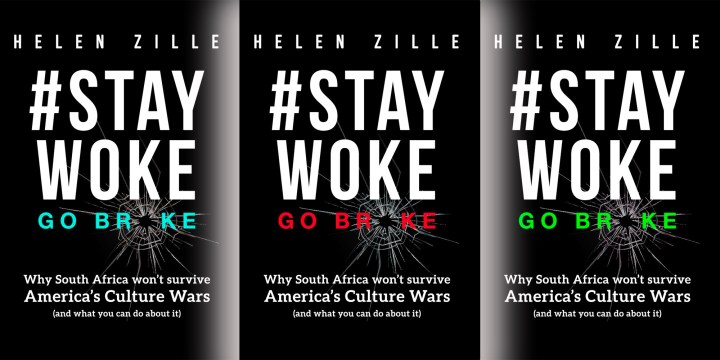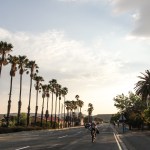TRAINSPOTTER BOOK REVIEW
Let the Ayn Rand fall, she will pick it up — Zille’s #StayWoke is a tragedy wrapped in farce

As the unofficial leader of the official opposition, Helen Zille remains a figure of political influence in South Africa. Her new book gives a sense of why that influence has diminished so considerably, while reminding us of an age-old literary truism: unless you’re a web developer, never — under any circumstances — read a book with a hashtag in the title.
Ah, the sheer pleasure of cracking open a new tome, the smell of ink and pulped trees wafting up to fire the synapses. The Laws of Erudition demand that we meet this moment with an open mind and an aching heart — surely something, anything, on the pages lying unmolested before us can enhance our lived experience, jettisoning our shared consciousness on to a bountiful, boundless new plane.
Did I say “lived experience”? I shouldn’t have. Those words in combination form part of the Woke lexicon, and constitute a trigger-term for the few remaking heroes fearlessly battling the leftie-speech Gestapo. Much has been written about the group-think impis, mostly on Daily Stormer and Breitbart, but here we are with a local is lekker version, compiled by none other than Helen Zille — former mayor of Cape Town, former premier of the Western Cape, uncancellable queen of anti-cancel culture.
Unless you can imagine Jacob Zuma writing a book, and I can’t, almost no other political figure in South Africa bears more freight. Most of us think we know Helen Zille, and most of us have prepackaged ideas regarding her politics. Reading her book thus becomes either an exercise either in endorphin-inducing confirmation bias or in brutal, unabashed masochism.
In the interests of full disclosure, I should declare that in times of darkness, I’ve never instinctively reached for the Zille canon. I will admit, however, that before she transformed herself into Tucker Carlson on methamphetamines, she had a sharp, lucid communication style. Believe it or not, she wasn’t always so “controversial”, and nor did she always define herself as a “classical liberal”, whatever that means. She was just a standard-issue lib, lodged in the middle of the South African political colon like an indigestible bread roll, more litigious and by-the-book than she was Make-South-Africa-Great-Again pugilistic. Prior to her radicalisation, she didn’t rail about an all-powerful progressive left, ruled with an iron hand by activist hobos in the Humanities faculties of our decrepit universities.
Zille has devoted the latter part of her career to countering this scourge. Due to the curtailment of free speech and free thought, she’s written a new book that is now available for purchase everywhere, and is also easily downloaded by anyone with the money or the inclination. Many clues for what we’re in for lurk in the title, which is … not so great. #Stay Woke: Go Broke — Why South Africa won’t survive America’s culture wars (and what you can do about it) does not exactly roll off the tongue, but is happily the longest sentence in the book. The physical copy could also use a bit of work. “#Stay Woke” has the frays-as-you-touch-it quality of a Zairean textbook, as if publisher Obsidian Worlds knew they were producing something illicit and shameful. It extends to the title design, where the “O” in “broke” is replaced with what looks like a photoshopped bullet hole, presumably a reference to South Africa’s horrific levels of violent crime. Or maybe it’s the results of a badly aimed cricket ball – an elegy for a man’s sport in an era of ubiquitous misandry.
That said, isn’t “never judge a book by its cover” one of Jordan Peterson’s famous rules?
Very probably.
So let’s dive in.
* * *
#Stay Woke’s thesis, according to Zille, is that “the fragility of South Africa’s democratic institutions may be unable to withstand the impact of the Woke Tsunami”. With the stakes so high, it’s only proper that the text begins with a helpful glossary of terms apparently designed to assist US readers taking a Culture War vacation to a country with the Big Five:
Twirritant: “A portmanteau word combining Twitter and irritants. Another word for trolls.”
Also, not a word.
Springbok: “A small buck (antelope) renowned for its exuberant leaps. It is South Africa’s national emblem, and the name of our national rugby team.”
Undeniably true.
Zuptabot: “The network of linked computers running fake social media accounts, to advance and protect the interests of the Zuma and Gupta families.”
Several issues begin to make themselves apparent. First, while Zille is solid on wildlife, she has always been a bit spotty on how social media is manipulated — a Zuptabot, insofar as such a thing exists, is not “a network of linked computers”, largely because we’re not living in a 1980s Bond film. Far worse, it quickly becomes clear that Zille’s late writing style splits the difference between Twitter and grown-up prose, so that every paragraph is a single Tweetable sentence in length, as if she’s anticipating an audience right on the cusp of dementia, but still compos mentis enough to loathe Critical Race Theory.
Following the glossary, we’re offered a wildly idiosyncratic history of America’s Culture Wars. We begin with the Marlboro Man, “the personification of masculine heterosexuality, [who] was probably more devoted to his horses and herds than to any woman.” (Not to mention the nicotine!) This somehow leads us to Donald Trump, who Zille is careful not to criticise too harshly, for fear of alienating their shared South African fanboys, and then on to “Tatiana McGrath”, a parody Twitter account that spoofs Woke speech.
“Not long ago,” writes Zille, tying up her argument like a home invader duct-taping a victim to a chair, “if you wanted to understand the two combative extremes of the Culture Wars, all you had to do was compare the Twitter feeds of @realDonalTrump and @TatianaMcGrath.”
Ja.
We’re now far enough into the text to get a sense of the DA impresario’s current rhetorical style. For one thing, she works her way through Republican Party talking points with grim commitment, as if she’s trying to pass a kidney stone through her tear ducts. For another, she’s constantly boxing her own shadow… and losing.
Take the first chapter-let, which is vividly, if unpleasantly, titled Splashed by the Woke Spittoon. Here, Zille resurrects an episode that took place at Cape Town’s “vibey” Obz Café in 2016. A white waitress named Ashleigh Schultz was serving two black customers she had failed to identify as “radical non-binary trans activists”. Instead of leaving Schultz a tip, “him/her/them” — I’m quoting here — left a nasty note, demanding that Schultz “RETURN THE LAND”, presumably a reference to the settler/colonial practice of land appropriation that has now been formalised by constitutionally guaranteed property rights. Schultz, who at the time allegedly did not own land, wept. These “white tears” apparently overjoyed the “activists”, whose names were named Ntokozo Qwabe and Wandile Dlamini, and who turned out — plot twist! — to be “wealthy” and “privileged”. The activists gloated about their intervention on Facebook, after which the story went viral. Schultz’s errant tip was crowdfunded by kind anti-Wokeists to the tune of tens of thousands of rands, and the formerly disadvantaged waitress was able to pay her rent and her mother’s medical bills.
Sounds like the script for a kykNET TV movie. But apparently, the story’s implications reverberate far wider than most unwoke Wokeists were able to process.
“Because of her pale skin,” writes Zille, “[Schultz] represented all whites and whatever evil every white may have perpetrated over centuries.”
In other words, Schultz is an individual with a specific set of “lived experiences” (whoops) who should never have been a mere extra in Qwabe and Dlamini’s Woke Culture Wars. But, if we employ the same logic, why are Qwabe and Dlamini cast as representatives of the entire progressive left? In Zillestan, members of the LGBTQI+ community apparently can’t be assholes like “normal” people; in her five or so cherry-picked examples of Woke stupidity, every instance of “radical non-binary trans activist” misbehaviour speaks to the larger Woke agenda. If you’re Woke, you’re always part of the zombie horde, and never just a rogue shit-heel.
Happily, it turns out that black folks can be individuals — that is, if they happen to agree with Zille’s positions on the Woke master-plot and its perpetrators. In the interests of scientific engagement, she tells us of an “unrepresentative online survey” she posted on — where else? — Facebook. In order to further collate information about local perceptions of Wokeness, she asked her “friends” what Woke meant. She approvingly quotes the presumably black and presumably real Thabang Tad Malatji (25), who responded by stating, “Being Woke is the worst thing a person can be today.”
Not a mass murderer. Not a vegan. Not Gwede Mantashe.
Woke.
* * *
But give Zille this much: she leaves no stoner unturned in her efforts to come fully to grips with her subject matter. There are way too many legendary Tweetagraphs to quote, but here’s a selection to whet the book-buying public’s appetite:
“When I started writing this book, I was interested to discover that young people have very different understandings of the word ‘Woke’, despite the fact that they use it so liberally.”
Ahem.
“In later years, [Woke] morphed into a multi-purpose term in black American culture, to describe the capacity to see through pretence, such as noticing the telltale signs that your girlfriend might be cheating on you.”
Indeed.
“As soon as they pick up the scent of offence, the Woke pack hunt begins, conscripting an army of real people, their sock puppets, and bots on Twitter, Facebook, and Instagram. Not to mention their ever-willing servants in the mainstream media, and every other noch-schlepper, (a magnificent Yiddish phrase my parents used to describe every tag-along pain-in-the-butt.)”
Yiddish!
As far as relatively more substantial ideas are concerned, her potted pub-talk history of the slave trade gets a solid 6 out of 10 on the gobshite-o-meter.
“In Africa, however, slavery pre-dated the arrival of colonialism by many centuries,” she intones. Yes, all the racist drunk uncle talking points make an appearance here, including revelations that black slave traders existed before white slave traders, and a historiographical reboot that reminds us that black people were killing black people in Africa long before white people arrived and started killing black people. Colonialism obviously had its problems — I mean, obviously! — but we can’t deny that raping and pillaging existed prior to the arrival of the aforementioned whities.
Now can we?
All of that said, Zille is not terrible when recounting a history of liberalism. She is a Western supremacist, yes, but has learnt that nuance can’t happen on social media, and if nothing else she is nuanced in these passages. Soon, though, we’re back to business. For those hoping for some economic insight — “go broke”, after all, forms part of the lengthy title — the disappointments will be manifold. Zille has never had a particularly good grasp of economic theory. (The irony is that her much-maligned successor as DA leader, Mmusi Maimane, had both an education in, and a passion for, macroeconomic policymaking.) Zille has always professed her love for free markets and open economies where competition drives innovation, but she has never successfully argued for how that can be achieved in the wake of apartheid’s socioeconomic devastation.
When she turns her eye to South Africa, her focus zeroes in on her big bugaboo: the ANC’s cadre deployment policy, which she sees as a betrayal of Nelson Mandela’s bedrock liberal values, and a move towards a race-based African hegemony. As far as I can make out, this is what Zille feels has destroyed the country. Like her pals at the Institute of Race Relations, she believes that the ANC’s National Democratic Revolution is well underway, rather than acknowledging that a hyper-capitalist rentier class has enabled corporate South Africa in order to enable itself, while bleeding out the state with a patronage network that constitutes the entirety of the political project.
Instead, the Soviets have been reincarnated in Luthuli House, and they’re coming for ya. “The world and most South Africans, especially the media, chose to believe what the ANC said to selected audiences, not what it was planning in the privacy of its inner sanctums”, she writes, a statement that is laughably inaccurate even by #Stay Woke’s low standards.
Anyway, her assertion here seems to be that “wokeness”, due to its association with affirmative action and race-based transformation policies, will inevitably lead to economic doom because it replaces the chaff for the wheat, and makes genuine meritocratic advancement all but impossible. Sadly, this rather childlike understanding of complex economic systems harks back to the 1980s, the golden age of neoliberal free-market conservative rhetoric, and has proved such a resounding failure that almost no one believes it anymore. In the US, even centrist Democrats have embraced progressive economic theory in order to pull the country out of its nosedive into rule-by-billionaire plutocracy, while the “right” doesn’t even bother with policy any longer, but endlessly prosecutes the Culture Wars that Zille so enthusiastically decries.
But if we’re being honest, Zille is a proud Culture Warrior, a Valkyrie contributing to an arc of conservative ideological meltdown that starts at really bad ideas that were nonetheless ideas, and ends at spittle-flecked fulminations about the threat of cancel culture and “radical non-binary trans activists”.
Perhaps the great problem with Zille as a “thinker” is that she has had no political education and no grounding in philosophical concepts that could help her understand how the world actually functions. (Her grasp of Marxism is beyond embarrassing; she appears to have no understanding of pre-colonial African governance systems.) She has made a series of assumptions about the efficacy of Mbeki-era austerity-based liberalism, the prevailing one being that it failed because of incompetence and corruption, not because the idea itself was manifestly incompetent and corrupt in a developing world context. Her lodestars, the usual coterie of Thatchers and Churchills and Madibas, can be of no intellectual assistance when Zille herself is unable to formulate any big political ideas to counter the floundering of “classical liberalism” in South Africa. With no political imagination, and even less political information, all she could ever offer was a clean — which is to say, a white — ANC.
In the Zuma era, as the ANC moved from a machine of patronage to a full-blown kleptocratic Death Star, Zille’s message proved to be both durable and politically profitable. She is correct when she says that the demographic of DA voters has never been properly parsed, and there has always been more diversity in their constituency than they were given credit for. As the DA grew, it made both practical and political sense to reflect this diversity — Zille cites this “transformation” as her biggest mistake, without seeming to grasp the reasons behind the decisions she herself made. In order to grow, the Democratic Alliance needed to become a democratic alliance, a coalition of forces swirling around the centre of the political spectrum, all of whom worked together not because of love, but because of expediency. And it needed to reflect that South Africa it hoped to serve.
Once, Zille appeared to dimly understand this. Her biggest failure, however, was her inability to manage this growth. No one saw race more clearly than Helen Zille, and when a bunch of bad decisions backfired, she blamed… cultural Marxism and Postmodernism.
And so #Stay Woke is a very American attempt to replace failed political ideology and implementation, not with better ideas, but with a series of “cultural” whipping posts, the same Fox News beats that are endlessly litigated in the conservative US press. She decries race-obsessed Wokeists while being entirely race-obsessed. She warns against Twitter while relentlessly focusing on Twitter. (Like a 14-year-old’s diary, the majority of the quotes in the book appear to be culled from social media). She loathes the victimhood and grievance game, while playing the perpetually aggrieved victim.
In all this, she comes off like a grumpy grandma drinking her seventh glass of sherry while slowly knitting an AR-15, whisper-shouting about the misbehaving Wokeists, lamenting the loss of the Marlboro Man and real able-bodied cis-het humans. It’s funny until you realise that South Africa desperately needs a viable political opposition.
Read this way, #StayWoke is not a farce, it’s a tragedy. As usual, Helen Zille has her Marxism, along with pretty much everything else, ass-backwards. DM

















 Become an Insider
Become an Insider
I generally enjoy reading Poplak but there has to be an exception. Shoemaker, stick to thy last.
In the woke of apartheid’s socioeconomic devastation, given her sentiments Zille’s eventual deviation from democratic plurality seems inevitable. Perhaps she regrets having made herself look silly dancing on stage, and all for nothing.
Not having read the book, she still has a point about the danger of extremism of any form.
except when its it’s her “opponents” that she strawmans instead of engaging in the subject of the argument.
Not worth a comment.
I love this article so, so much. Thank you for this. I so desperately needed to hear it all said so well.
Uh, sorry Andrew Johnson, my comment was just supposed to be a comment, not a reply to your no comment…
An axe to grind?
Obviously! So what actually is so bad about Zille? So Poplak does not like what she wrote. Is that so dreadful? As a journalist writing for DM he has this power to write without allowing a reply by the victim of his sniggers.
Poplaks hatred for Zille is well known…
Oh yeah! Mine too
Proud of your hatred??
and his dissatisfaction seems well articulated and justified
Well articulated?…yes. Justified? That’s a matter of opinion…its an ad hominem attack laced with association fallacies…pretty much what he accused Zille of.
Spot on. But will he allow Zille tor write a repost?
I think i will now buy the book
Same.
I love you Richard! I wasn’t going to read the lady’s book. I’m still not going to
Dear Richard, as always I love your mind, and this read was no exception. Your images are amazing! And for the first time in a while, I agree with your ideas too. We suffer so much polarisation of thinking that everyone can justify their position by simply rejecting the opposite. A dangerous tragedy indeed.
This justification by simply rejecting viewpoints is happening very much on both sides of the political divide. This article is very much proof of that.
The thing about the woke movement – not what it says, but how it deliberately segregate us again! in tribal groups and stoke hate between the groups. Sounds familiar, been down that road before.
Fell asleep reading this!
Did all the big words exhaust your brain? 😀
Yes
Touche. 🙂
And not a single fruck?
Disappointing, but not unexpected from Mr Poplak. He is more interested in character assassination than discussing the merits of the arguments made in the book. It is a waste of time reading this clickbait article because I’m no closer to understanding what the book is actually trying to say.
Zille has become the DA’s Zuma, breaking down a once proud party due to her narrow self interest and lack of guiding principles. It’s clear from this book that she thinks the DA’s future lies in becoming a light weight alt right party.
To be fair, has the DA ever been anything but exactly that? Or the DP before them? Or the PFP before them …?
You could not be more wrong – you owe a debt of gratitude to her for her courage
Absolutely.
Another self-promo by Mr Poplak. Look how clever he is.
What a nasty bit of crap by Richard Poplak. I didn’t look at who the author is before reading and supposed it was written by a teenager with an twisted crush on Helen. So personal. Unnecessarily cruel. Whatever he thinks of Helen Zille she is part of our political landscape. No worse than many an other.
Poplak is a good journo – not as good at book reviews or judging personal and political impacts.
No worse than many other politicians? Not exactly reaching for the stars here when it comes to the party who wants to be the competent alternative
Love your work Richard. A good giggle on a Wednesday away from the doom and gloom of our beautiful but sad country.
I will ensure that when I finish my book it has the proviso that said Richard may NOT under any circumstances publish a review!
Just spiteful, no sense that a balanced view has even been attempted. Now I’ll have to buy the book and make up my own mind. Just think how Stephen Fry would have approached this book: with gentle humour and a sincere attempt to understand the writer’s views, even if he should disagree with them. DM can do better than this.
Best 16 minutes of my week. Glowingly astute! Richard, you’re a national treasure.
Dorothy Parker once said of Atlas Shrugged (Ayn Rand), “This is not a novel to be tossed aside lightly – it should be thrown with great force!”
Morrison: I would like to know why Atlas Shrugged offends you so much?
I read it (and other Rand titles) early and late high school, and in my thirties. Yes it did make me ruthless in not tolerating “non-schleppers”. No, it did not make me a monster.
I was tired of damn excuses before I was 17
I think you mean noch schleppers?
Fat fingers problem
Vitriolic. So one-sidedly vicious and hate-filled, it makes me doubt the journalistic credibility of the Daily Maverick.
This is typical Poplak. One either loves or hate his articles. Then the question arises ‘Are his articles appropriate for Daily Maverick which, rightly, prides itself on its stellar investigative journalists and analysts?’.
Yes, just the occasional serious and balanced review would be nice. Poplak’s vitriol does not feel wholesome. I tend to feel slightly nauseous after I have read such material. In future I’ll be avoiding it when I can, but the pull of this kind of material can be powerful.
Helen Zille’s Marxism? Throw 100 devoted Marxists together and you will have 100 versions…
Verbose vitriolic vituperation going as journalism?
I read both the book and this ‘review’, and find Poplak’s sarcasm and turn of phrase unfunny, shallow and so obviously just a personal attack. Pity he didn’t try to engage with the main strands of her argument. Insulting a person and then tweeting about it (as he did earlier), is just a smear.
Love her or hate her, Helen Zille is a lady who has given her soul to this country, fighting for the promotion of racial equality and economic sustainability. Richard – what have you done lately?
Don’t forget HZ tweeting anti vaxx nonsense and supporting colonialism
I don’t forget. Show me a single politician who has served as long as Zille without a single error in judgement…
To err is human, to steal is ANC.
I do not recollect her supporting colonialism. I remember her saying (paraphrased) that not everything about colonialism was bad. That is patently true if one has an open mind. England has a lot to be grateful for from the Roman occupation . Should we now be hating Italy?
Those who say Zille supported colonialism are not thinking straight. READ THE TWEET!
Richard Harding, that’s a very strange question to ask a dedicated and productive journalist. Or do you genuinely believe that good journalism amounts to doing nothing?
What do I genuinely believe?
– comments like this “As usual, Helen Zille has her Marxism, along with pretty much everything else, ass-backwards.” are subjective, personal bottom-feeder journalism.
– if every politician in the country were like Helen Zille we’d all be a damn sight better off
I was expecting something bad she said about Ayn Rand. Not sure to be disappointed or not
Keep writing for DM Richard. The complaints below only serve to justify your words. Zille is as much a dinosaur as Mantashe. Neither one has a clue about the modern world. So if no Poplak then I don’t want DM. Can do without all these moaners too.
Yes but the modern world is hopelessly screwed up
Yes. I agree. Love his writing, disagree with some of his outcomes in this article, some of which are at best, a stretched overreach. I think his dissing of Zille (often deserved – I am no fan) tainted his views. Shows he’s (mostly) human. 🙂
Come, come Poplak. “hyper capitalist rentier class”? Sure, corporates have taken full advantage but using whose money again? Log. Eye. Remove.
Feels like Poplak swallowed a dictionary – read about halfway and then gave up.
Okay lost interest half way through in both the story and Zille. Oh no wait, I lost interest in Zille ages ago.
Funny that you want a viable political opposition, Mr Poplak, when you vilify, abuse and undermine any political leader who espouses moderate, liberal, values or speaks ‘un-woke’ truth.
This is not a book review. It’s a poisonous personal attack.
Disappointed that DM published this biased diatribe
Is this guy in touch with reality? Comparing Helen Zille to Tucker Carlson, Breitbart and Fox-News is laughable. A bit of a disingenuous attempt to grapple with the subject matter. Lots of style, very little substance.